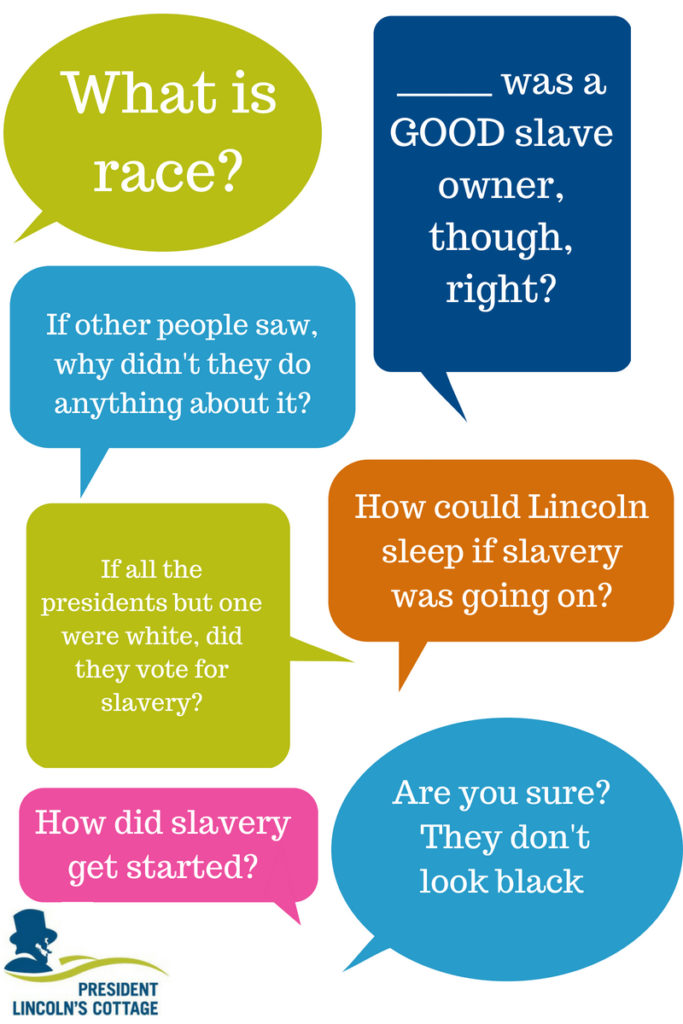People often shy away from talking to children about tough, complex subjects like slavery. Working at a Civil War site, those topics are pretty much unavoidable. We polled our front-line staff, including our Museum Program Associates (MPAs), who give guided tours, work with school groups, and field tough questions every day. We wanted to know, what questions have students asked about slavery? How did you respond?
Senior MPA Joan Cummins has been keeping a list of her own and will be presenting on this topic at the National Council on Social Studies Conference in November.
“I’ll be using my list at the conference to illustrate that kids can and do take slavery seriously as a subject, and that they’re capable of critical inquiry about it even when very young,” she explains. “We’re hoping to combat some of the fear around teaching slavery to young people.”
1. “Are you sure? They don’t look black.”
This question is often asked when we talk about William Slade and Elizabeth Keckley on tours. Mr. Slade and Mrs. Keckley were both fair-skinned black Americans because they each had significant non-African ancestry. This revelation naturally then leads to discussions about plantation families and how white men often had children with enslaved women. I tell students this meant white persons could own and sell their kin as slaves. Particularly with younger students it’s tricky to fully discuss this without going too much into sexual assault. However teenagers — especially teenage girls — are usually pretty keen to talk about that and relate it to contemporary treatment and harassment of women. – Curtis Harris, MPA
2. “What is race?”
One of my hardest days at the Cottage was when a group of first graders asked me what race was. I explained that race is something that people made up to justify slavery in America. Europeans used skin color to divide people, and it still divides people today. I knew I was explaining a concept with consequences that would affect them for the rest of their lives. As this country continues to grapple with race and the legacy of slavery, I am hopeful that my generation and theirs can continue the hard work of dismantling racism in America. – Taylor Horst, MPA
3. “ _________ was a GOOD slave owner, though, right?”
This question usually is asked because they can’t reconcile that someone they’ve been taught to revere, owned people. – Callie Hawkins, Director of Programming
4. “Was there ever a president who had been a slave?”
A first-grader asked me this question as we sat in the Emancipation Room. – Joan Cummins, Senior MPA
5. “But wait, people aren’t supposed to be bought for money?!”
I once had a young boy on my tour, probably about 8 or 9 years old. We were talking about slaves defined as property and buying and selling slaves and all of a sudden he exclaimed, “But wait people aren’t supposed to be bought for money!” – Amy Benjamin, MPA
6. “How could Lincoln sleep if slavery was going on?”
For this question I said, more or less: he couldn’t. A lot of the time he would pace back and forth in the middle of the night thinking as he was working on what to do about it. – Joan Cummins, Senior MPA
7. Q. “What do you call people who don’t get paid for their work?” A. “A volunteer”
I was sitting in the dining room with a group of second graders, talking about the staff Lincoln employed here at the house. We talked about the maid, Mary Cuthbert, the usher William Slade, and the cook, “Aunt” Mary Williams. An astute little girl asked me if they all got paid to do their jobs. “Of course they did,” I said, grateful for the organic segue. “What do we call people who don’t get paid for their work?”A little hand shot up, quick as lightning.
“Yeah, go ahead little buddy,” I said.
“A volunteer!”
The other children nodded their heads and gestured in agreement. The adults standing behind me laughed. I died a little inside, but quickly recovered.
The kids and I had another hour together. Our conversations were fun and fruitful. Working with kids at the Cottage was not something I thought I’d be good at. I’ve grown to love it, and the kids constantly keep me on my toes. Breaking down complicated concepts helps me work through what I know and feel about our content, and keeps me humble. – Kevin Lukacs, MPA
8. “How did slavery get started?”
I’ve gotten this question several times, but most recently from a third-grade student as we examined the Emancipation Proclamation and 13th Amendment printings that were on exhibit at the Cottage with his class. – Joan Cummins, Senior MPA
9. “If the other people saw, why didn’t they do anything about it?”
For this question, it was part of a larger conversation about how slavery had gotten started and the fact that enslavers were doing it because it was making them a lot of money, and so my answer to that student had to do with slavery also making a lot of money even for the people who weren’t doing it. But also, that there were people trying to/working to stop it as well. – Joan Cummins, Senior MPA
10. “Why would they be anti-slavery but ‘for’ colonization?”
A 10th grader astutely asked this question, calling out a double standard. – Joan Cummins, Senior MPA

